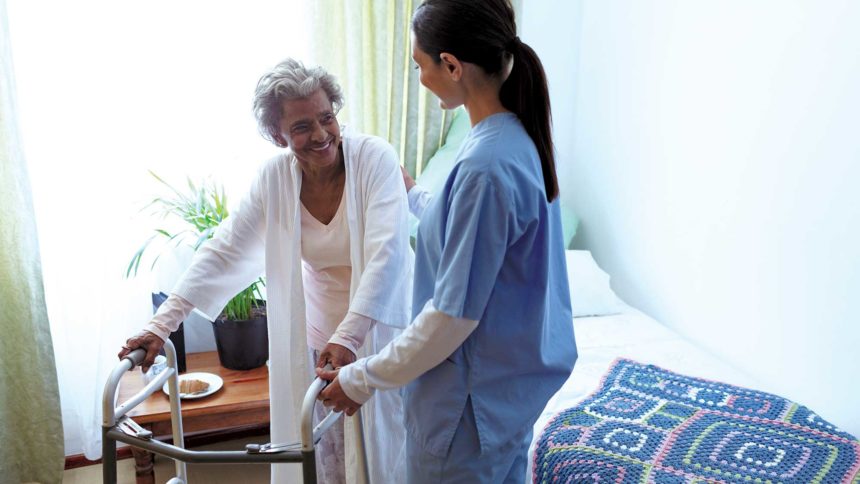
The federal government is waiving its three-day stay requirement for Medicare skilled nursing facility coverage as it works to respond to the COVID-19 outbreak across the United States.
The waiver of the rule comes after President Donald Trump on Friday declared a national state of emergency for the 2019 novel coronavirus disease.
The emergency declaration now means that CMS will provide temporary emergency coverage of SNF services — without a qualifying hospital stay — for people who need to be transferred as a result of COVID-19. For those who have executed their SNF benefits, the declaration also authorizes the renewed SNF coverage without first having to start a new benefit period.
“This will greatly help our nation’s providers to ensure that sufficient health care items and services are available to meet their needs,” the American Health Care Association / National Center for Assisted Living told McKnight’s in an emailed statement Monday.
“With coronavirus’ impact here and growing — a time of emergency — we agree that withdrawing the three-day stay requirement is a positive step that will help to reduce red tape,” Ruth Katz, LeadingAge’s senior vice president of policy, told McKnight’s. Providers have long advocated for the elimination of the three-day stay rule altogether.
The emergency declaration also waives deadline requirements for Minimum Data Set assessments and transmission for SNFs.
“We believe this makes sense given that providers are in an emergency mode, with limited bandwidth,” Katz added.
The declaration also frees up to $50 billion in financial resources to states impacted by the outbreak, according to multiple sources. In addition, lawmakers are working on a funding relief bill.
Katz said wherever and however additional funds are made available, the needs of aging services providers resulting from COVID-19 “must be addressed.”
Daunting dining demands
While not clinically focused, nursing home operators continued to strain Monday with the “no communal dining” edict laid out by the White House on Friday. It has staffing, compliance and, in some cases, direct resident safety implications.
Many assisted living and independent living facilities also have started to separate residents during meal times. “Absolute pandemonium” was one worker’s description of one Illinois provider’s attempt at trying to coordinate food orders, in-room delivery and clean-up for the first time Monday.
“Cancelling communal dining is not unheard of in skilled nursing facilities. It is one response that a SNF may be experienced in taking, say, in past responses to contain other communicable disease outbreaks [such as flu or norovirus],” noted Jodi Eyigor, Nursing Home Quality and Policy at LeadingAge, in an email to McKnight’s. “That said, it is a measure that places considerable strain on a provider’s system, particularly in regard to staffing — a challenging area for aging services pre-pandemic that’s heightened now, given the possibility of employees getting sick or needing time off for childcare, as schools across the country are closing.”
In-room dining requires staff to deliver and retrieve meals from all resident rooms, while also ensuring that meals maintain required temperatures and are served in accordance with proper sanitation procedures, such as covered dishes and carts.
One of the biggest complications is having enough workers for residents who need some level of assistance while eating, Eyigor added.
“Help with set-up, such as having lids removed from drinks and/or cuing for safety, such as safe swallowing techniques or, for a resident living with cognitive impairments, curing for the task. In a communal dining setting, one staff member may be able to help multiple residents at one time. But if residents are all dining in their own rooms, or in a shared room, more staff will be needed to assist each resident in need of help.”
Vaccine testing underway
On Monday, scientists with the Kaiser Permanente Washington Institute in Seattle began the first test of an experimental coronavirus vaccine on healthy volunteers. The vaccine will ultimately be tested on 45 people, KTLA 5 reported.
Even if all goes well, researchers say a vaccine for widespread use still won’t be available for 12 to 18 months.
Overall, the total number of COVID-19 cases reached about 3,500 in the United States as of Monday afternoon — along with 68 deaths. A nursing home patient in South Carolina was the state’s first death related to the outbreak.
The president on Monday also released a 15-day plan to slow the spread of COVID-19. Recommendations include to stay out of bars and restaurants, and not gather in groups larger than 10.





